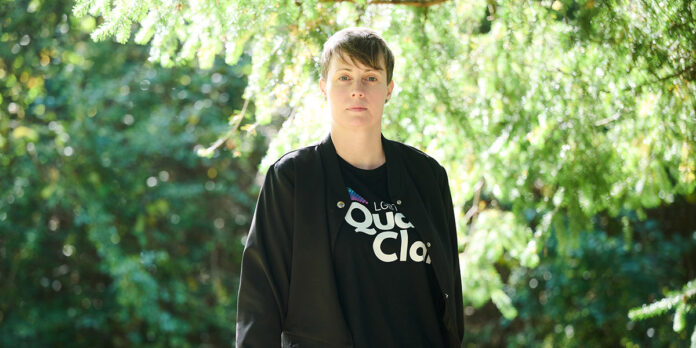Karina Murray was 34-years-old before she attended her first LGBT+ event in Clare. Unlike most counties in Ireland, Clare has had virtually no visibility amongst the LGBT+ community.
This resulted in countless Clare people feeling unsafe to remain in their home town or village, with thousands emigrating to Dublin or abroad in recent decades. Karina has been heavily involved in Quare Clare for a number of years and was one of the organisers behind Clare’s first Pride celebration which took place in Shannon in 2022.
She says that, growing up in Shannon, it simply wasn’t safe to come out.
“I was 34 before I attended a LGBT+ event in Clare. It was amazing, I spent all of my time going to Dublin,” she said.
“The impact of no visibility is that you leave. When I was old enough, I left and went to Dublin, then I went to Toronto for a few years. That is the same for a lot of LGBT+ people in the country, if you are not living in a city, you have to leave to make a connection.
“You are forced to leave your home. If you want to find a community or a romantic partner, the first impact is that you have to leave the place where you grew up because there is nothing here.
“When I was young, I wasn’t sure if it was safe to come out. No-one was talking about it. I went to the Comp [St Patrick’s Comprehensive] in Shannon, and I never heard anyone talk about lesbians, gays, bisexuals, whatever, when I was growing up.
“I couldn’t comprehend what was happening for me, it was not a safe space for me to come out in. Nobody was talking about it, there was no visibility. I first found an online community to connect to, which isn’t the safest thing to do, but I had no choice because there was no-one in Shannon that I could connect with.
“There was a negative impact on me and my mental health, not being able to be open with the people I loved. But I wasn’t sure was it safe, there was no visibility, there was nothing here. It is great to have something now.”
With so many members of the LGBT+ community leaving Clare in recent decades, it is possible that sections of the straight community believed that there were no queer people in the county.
“I think that some people must have thought there was no LGBT community here in Clare. Now that there is some visibility, people seem to take issue with it. But we were always here, we were just invisible. We weren’t talking about it,” she said.
“It would have made such a difference to me 10 or 20 years ago to have seen a Pride celebration or to see the Pride flag flying around the county.
“That visibility not being there for such a long time maybe gave the general population the impression that there was no LGBT+ community living in Clare and that was just something that happened in the cities. We have always been here but we were not as visible as we are today.”
Karina believes that the recent upsurge in homophobic activity in Clare is a result of small, online communities which receive misinformation about LGBT+ people, often from abroad.
“I think a lot of this has to do with a disconnection from communities, not just the LGBT+ communities, but all sorts of minority communities. People get caught in a small circle of people who share the same opinions. The people who are commenting online, I think it is highly unlikely that they are connected to people from the LGBT+ community,” she said. “There is a disconnection that is really important to understand. They [people making homophobic comments] are not seeing the people who attended the Pride parade, they are not seeing the people who go to the Quare Clare events.
“They go down this web of lies and misinformation that talks about LGBT+ communities in a negative light. Sometimes this comes from foreign sources, it’s not always from people here in Clare or in Ireland.
“This seeps in and it creates a situation where people have negative feelings towards a community who are completely harmless. Pride weekend was a great celebration, a time to get out and a time to be seen. Those people who are making those comments are totally disconnected from the real people, and the online world is giving them a platform to say things that they wouldn’t say to a person’s face.”
For the first time ever, there is a growing number of openly gay young people in Clare. Karina believes that some of the comments made online about the recent celebration of Clare Pride would have devastated her, if she had seen them as a teenager.
“It is really damaging for people, especially younger people. I am older now, I am out. If I had seen comments like this when I was in my late teens or early 20s, it would have had an extremely negative impact on my ability to be out and proud and seen,” she said.
“I still amn’t be comfortable holding hands with my partner in Clare.
“I wouldn’t do it in Shannon, I don’t know would I do it in Ennis or some of the smaller towns. Maybe I should be leading the way more? I don’t know. But I don’t feel safe holding hands or showing affection to my partner in Clare at this point in time.
“Online comments contribute to that. The people making these comments are from Clare. When you read them, you wonder, why do they feel this way about me? I am the person who they have these opinions about.”
According to Karina, this wave of ultra-conservatism in Clare is not just being targeted at the LGBT+ community, but is being targeted at all minority groups.
“Clare is becoming more diverse, but it seems that some people in Clare are not happy about that,” she said.
“This is not just about the LGBT+ community, this is about a lot of different minority groups. I wonder are we as welcome in Clare as I felt before. This incident around the comments [on The Clare Champion social media] has made me feel like we are not.
“As beautiful as it is and as much as I love Clare, I don’t think it is as welcoming as we think. I have held hands with my partner in Galway, Cork and Dublin.
“Why am I not comfortable doing that in my own county? There is an element of safety there, but also feeling more judged in Clare.
“I think there is an onus on people like me to make it better for the younger generations. You do feel responsible for making the county more inclusive.
“That is part of the work of Quare Clare. But how do you do it? Too many people are surrounding themselves with conversations online and not talking to real people.
“I think that talking to real people, hearing their real stories, helps you to get around the hatred and dislike and the prejudice. There needs to be a real-life, in person connection.
“The most important thing to do is to get to know the LGBT+ community in Clare. To really get to know them as people and see that there is nothing to fear and nothing to hate. The biggest obstacle to this is social media and the online world.
“We got a lot of negativity [online] about Pride but in a way that is important to bring up the issues and start the conversation. The people who are making the comments and saying these negative things about our community, I’d love to know why they are doing that. “What has happened to them to make them feel this way or think this way?”
Andrew Hamilton is a journalist, investigative reporter and podcaster who has been working in the media in Ireland for the past 20 years. His areas of special interest include the environment, mental health and politics.


